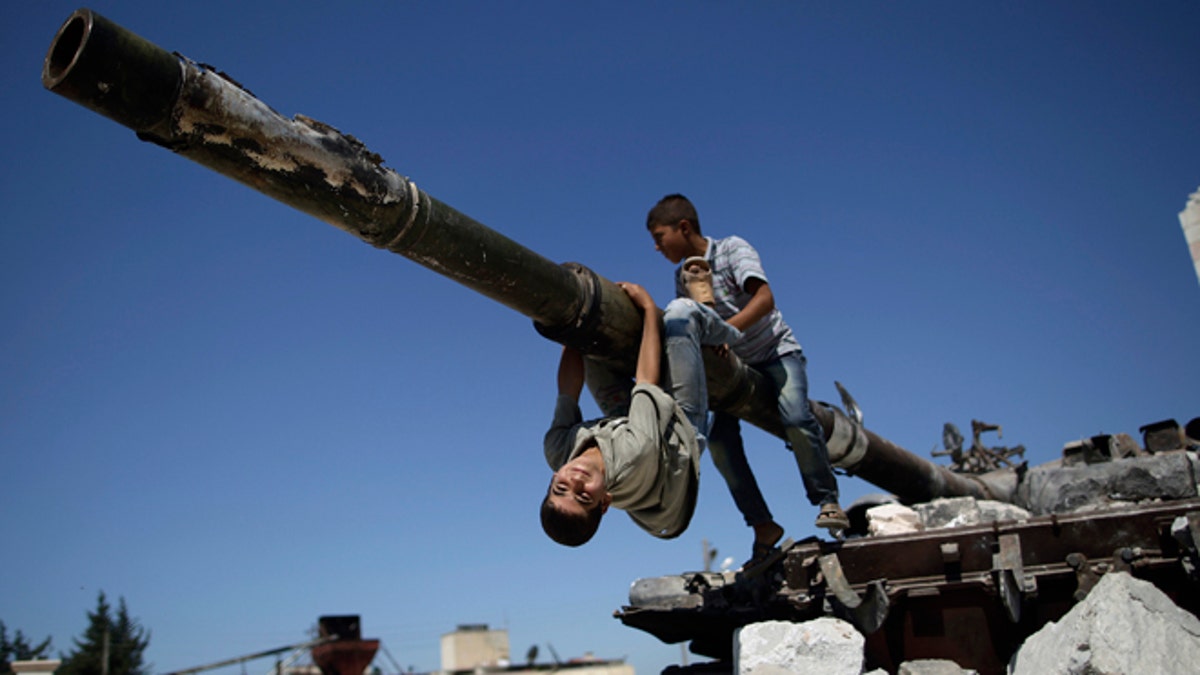
Sept. 2, 2012: A boy looks back while he and another boy play on a Syrian military tank, destroyed during fighting with the Rebels, in the Syrian town of Azaz. (AP)
BEIRUT – Two activist groups said Sunday that about 5,000 people were killed in Syria's escalating civil war in August while the U.N. children's fund UNICEF put the death toll for last week alone at 1,600. They were the highest figures reported since the uprising began more than 17 months ago.
The activist groups also raised their estimated death tolls for the entire uprising to at least 23,000 and as high as 26,000. The previous estimates, more than a month ago, were around 20,000.
The civil war witnessed a major turning point in August when President Bashar Assad's forces began widely using air power for the first time to crush the revolt. The fighting also reached Syria's largest city, Aleppo, which had been relatively quiet for most of the revolt.
"The past month witnessed large massacres and the regime was conducting wide operations to try to crush the uprising," said Omar Idilbi, a Cairo-based activist with the Local Coordination Committees. "Last month's acts of violence were unprecedented."
He said the increased use of the air force and artillery bombardments was behind the rise in casualties.
The Britain-based activist group Syrian Observatory for Human Rights said that 5,440 people, including 4,114 civilians were killed in August. The LCC put the toll at 4,933 civilians.
On Thursday, Human Rights Watch said government forces have killed scores of civilians over the past three weeks by bombarding at least 10 areas where they were lining up to buy bread at bakeries near and around Aleppo.
Last week, activists reported that between 300 and 600 people were killed in the Damascus suburb of Daraya during days of shelling and a killing spree by troops who stormed the town after heavy fighting.
The two main activists groups also released new death tolls for the entire uprising since March 2011. The Observatory said more than 26,000 have been killed, including more than 18,500 civilians. The LCC put the death toll at more than 23,000 civilians.
The LCC does not count members of the military who are killed, but the Observatory does.
The U.N. and Arab League have both led prolonged but ultimately failed efforts to negotiate an end to Syria's violence.
Turkey this week called for the U.N. to authorize creation of a safe zone in Syria for tens of thousands fleeing their homes. Britain and France have left open the possibility of more aggressive action, including a military-enforced no-fly zone to protect a safe area -- though that still seems a remote possibility.
Lakhdar Brahimi, the U.N.'s new envoy to Syria, told Assad's regime on Saturday that change is both "urgent" and "necessary" and that it must meet the "legitimate" demands of the Syrian people, words that will not win the seasoned Algerian diplomat and international trouble shooter any friends in Damascus.
On his first day on the job, Brahimi also called on both sides to end violence in Syria, but said Assad's government bears more responsibility than anyone else to halt the bloodshed.
